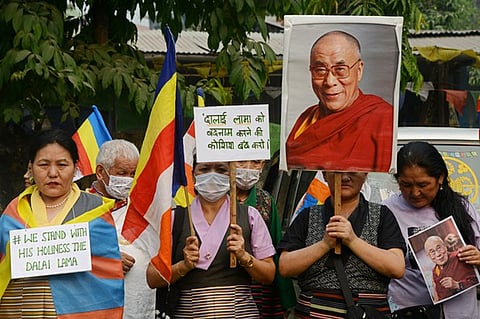Tibetan demonstrators held rallies in Europe, the United States, India and Australia this week to protest negative media coverage of a video of the Dalai Lama asking an Indian boy to suck his tongue in what Tibetans say was a misinterpretation of an innocent, playful act.
A video of the Tibetan Buddhists’ spiritual leader hugging and kissing the young boy on the lips at a student event in northern India on Feb. 28 went viral on social media and sparked online criticism and accusations of pedophilia.
The Dalai Lama, 87, later apologized to the boy’s family, and Tibetans quickly came to his defense, explaining that sticking out one’s tongue is a greeting or a sign of respect in their culture.
More than 2,000 Tibetans and their supporters rallied in Switzerland, demanding that local media apologize to the Dalai Lama for misinterpreting the video. Activists approached one news organization that agreed to look into the matter.
“I have never seen Tibetans gathered in such a huge number in a long time, and it is very important that we organize these rallies against those who defamed His Holiness the Dalai Lama,” said Tenzin Wangdue, vice president of the Tibetan Association of Liechtenstein,
More than 300 Tibetans and Indian supporters gathered in Bangalore, India, to demand apologies from news organizations. About 15,000 people gathered on April 15 in Ladakh, a region administered by India as part of the larger Kashmir region and has been the subject of dispute between India, Pakistan, and China for decades.
“We the faithful followers of His Holiness The 145th Dalai Lama are deeply saddened and shocked by the deliberate attempt of many news/media portals, circulating a tailored propaganda video clip to defame and malign the impeccable character and stature of His Holiness The 14th Dalai Lama,” said a statement issued on April 14 by the Ladakh Buddhist Association’s Youth Wing in Kargil to show its solidarity with the Tibetan Buddhist spiritual leader.
When the Dalai Lama meets with people, “he speaks with them freely, without any reserve or cautiousness, as if they were long-time friends, and treats them lovingly,” said Ogyen Thinley Dorje, the Karmapa, or spiritual leader and head of the Karma Kagyu tradition of Tibetan Buddhism, one of the four major lineages of Tibet.
“Sometimes he does playfully tug someone’s beard, or tickle them, or pat them gently on the cheek or nose,” he said in a statement issued on April 12. “This is just how he normally is, and it shows no more than his genuine delight and love for others.
Tibetans living in western China’s Tibet Autonomous Region and Tibetan-populated areas of Chinese provinces as well as those who live abroad believe the Chinese have used the video to cast a dark shadow on the Dalai Lama.
“Tibetans inside Tibet have seen and heard about the video clips on various social media,” said one Tibetan from inside the region, who declined to be identified for safety reasons.
“It is so pleasant to be able to see pictures of His Holiness the Dalai Lama, but at the same time it is heartbreaking to see how the Chinese government is taking advantage of this and manipulating the playful video interaction between the Dalai Lama and the young Indian boy,” the source said.
Many Tibetans inside Tibet have not publicly commented on the video, knowing that it would be dangerous to do so because of China’s heavy surveillance and repression in the region, said another Tibetan who declined to be named for the same reason.
“The Chinese government would track down the individuals and punish them and they would be sentenced to three to four years [in prison],” the source said. [RFA/NS]


